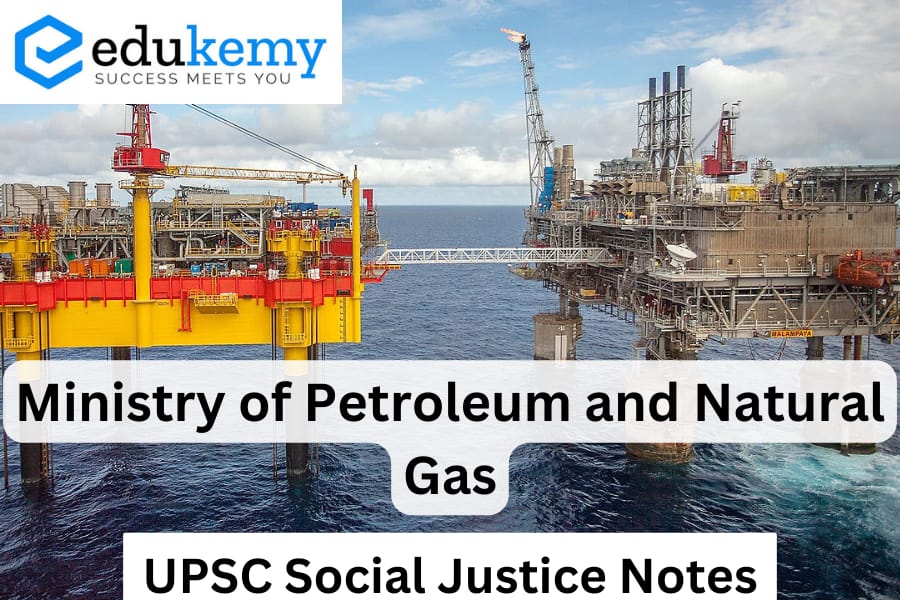
The Ministry of Petroleum and Natural Gas is a key governmental body responsible for the formulation and administration of policies regarding the exploration, production, refining, distribution, and marketing of petroleum and natural gas resources in India.
Established in 1973, it plays a crucial role in ensuring energy security for the nation by overseeing the development of the oil and gas sector. The ministry’s objectives include fostering domestic production, attracting investments, promoting research and development, and ensuring equitable distribution of petroleum products across the country.
Contents
- 1 FAQs
- 1.1 Q1. What is the role of the Ministry of Petroleum and Natural Gas in India?
- 1.2 Q2. How does the Ministry regulate the petroleum and natural gas industry?
- 1.3 Q3. What steps is the Ministry taking to attract investments in the oil and gas sector?
- 1.4 Q4. How does the Ministry address environmental concerns associated with the oil and gas industry?
- 1.5 Q5. What is the Ministry’s role in international relations related to petroleum and natural gas?
- 2 In case you still have your doubts, contact us on 9811333901.
Sustainable Alternative Towards Affordable Transportation (SATAT)
Sustainable Alternative Towards Affordable Transportation (SATAT) is a commendable initiative focused on promoting sustainable transportation alternatives. Here are the key details:
- Objective: SATAT aims to establish Compressed Bio-Gas (CBG) production plants with the purpose of making it readily available in the market for utilization as an automotive fuel. This is achieved through the invitation of Expression of Interest (EOI) from potential entrepreneurs.
- Launch and Stakeholders: The initiative was launched in October 2018 and is a collaborative effort between the Ministry of Petroleum & Natural Gas and prominent Public Sector Undertaking (PSU) Oil Marketing Companies (OMCs), including Indian Oil Corporation Ltd., Bharat Petroleum Corporation Ltd., and Hindustan Petroleum Corporation Ltd.
- Production Targets: The Government of India, as part of the SATAT initiative, envisions the establishment of 5000 CBG plants by the year 2023-24. These plants collectively aim to achieve a production target of 15 Million Metric Tonnes (MMT) of CBG.
- By encouraging the production and utilization of Compressed Bio-Gas, SATAT contributes to the reduction of carbon emissions and dependence on traditional fossil fuels, promoting a more sustainable and environmentally friendly transportation sector in India.
FAQs
Q1. What is the role of the Ministry of Petroleum and Natural Gas in India?
The Ministry of Petroleum and Natural Gas is responsible for formulating and implementing policies related to the exploration, production, refining, distribution, and marketing of petroleum and natural gas resources in India. It plays a crucial role in ensuring energy security for the nation and promoting the sustainable development of the oil and gas sector.
Q2. How does the Ministry regulate the petroleum and natural gas industry?
The Ministry regulates the petroleum and natural gas industry through various mechanisms, including the establishment of regulatory bodies like the Petroleum and Natural Gas Regulatory Board (PNGRB). These bodies oversee activities such as exploration, production, refining, marketing, and distribution to ensure compliance with regulations and promote fair competition in the sector.
Q3. What steps is the Ministry taking to attract investments in the oil and gas sector?
The Ministry is actively working to attract domestic and foreign investments in the oil and gas sector by implementing investor-friendly policies, offering incentives, and streamlining regulatory processes. It collaborates with industry stakeholders to identify investment opportunities, promote exploration and production activities, and enhance infrastructure development to support growth in the sector.
Q4. How does the Ministry address environmental concerns associated with the oil and gas industry?
The Ministry prioritizes environmental sustainability in the oil and gas industry by promoting the adoption of cleaner technologies, enforcing environmental regulations, and supporting research and development initiatives aimed at reducing emissions and minimizing ecological impact. It encourages the use of renewable energy sources and implements measures to mitigate environmental risks associated with exploration, production, and refining activities.
The Ministry manages India’s international engagements in the petroleum and natural gas sector by negotiating agreements, fostering partnerships, and participating in multilateral forums. It collaborates with other countries to enhance energy cooperation, secure access to hydrocarbon resources, and promote technology transfer and knowledge sharing in the global energy landscape.
In case you still have your doubts, contact us on 9811333901.
For UPSC Prelims Resources, Click here
For Daily Updates and Study Material:
Join our Telegram Channel – Edukemy for IAS
- 1. Learn through Videos – here
- 2. Be Exam Ready by Practicing Daily MCQs – here
- 3. Daily Newsletter – Get all your Current Affairs Covered – here
- 4. Mains Answer Writing Practice – here

